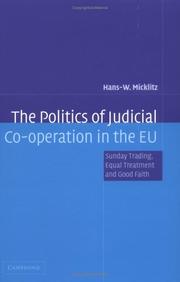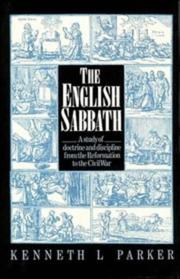| Listing 1 - 3 of 3 |
Sort by
|
Book
ISBN: 9782021011821 2021011828 Year: 2013 Publisher: Paris : Éd. du Seuil,
Abstract | Keywords | Export | Availability | Bookmark
 Loading...
Loading...Choose an application
- Reference Manager
- EndNote
- RefWorks (Direct export to RefWorks)
Au coeur de la culture chrétienne, le dimanche est devenu, avec l'évolution des sociétés modernes et le reflux de la religion, un simple temps de repos, propice aux divertissements et à l'oisiveté. A l'aide de nombreuses archives, l'auteur détaille cette évolution et met en avant le rôle des pouvoirs dans la propension à imposer leur propre perception de la temporalité.
Sunday --- Recreation --- Dimanche --- Loisirs --- History --- Social aspects --- History. --- Histoire --- Aspect social --- Europe --- Social life and customs --- Moeurs et coutumes --- --Repos --- --Pratique religieuse --- --Histoire des mentalités --- --XVIIe-1830, --- Sunday legislation --- Leisure --- Repos dominical --- Lord's Day --- Sunday observance --- Days --- Fasts and feasts --- Rest --- Sabbath --- Blue laws --- Law, Sunday --- Ecclesiastical law --- Hours of labor --- Labor laws and legislation --- Weekly rest-day --- Holidays --- Sabbath legislation --- Store hours --- Free time (Leisure) --- Leisure time --- Religious aspects --- Christianity --- Law and legislation --- Social life and customs. --- Dimanche. --- Histoire. --- Repos --- Pratique religieuse --- Histoire des mentalités --- XVIIe-1830, 1601-1830 --- Sunday - Europe - History --- Sunday legislation - Europe - History --- Sunday - Social aspects - Europe --- Leisure - Europe - History --- Europe - Social life and customs

ISBN: 9780521825160 0521825164 9780511495021 1107137624 051118140X 0511113315 0511299133 0511495021 1280434759 0511198108 0511112807 9780511113314 9780511112805 9781280434754 Year: 2005 Publisher: Cambridge Cambridge University Press
Abstract | Keywords | Export | Availability | Bookmark
 Loading...
Loading...Choose an application
- Reference Manager
- EndNote
- RefWorks (Direct export to RefWorks)
The European legal order is largely based on judicial co-operation between the European Court of Justice and the national courts. Three case studies on Sunday trading, on equal treatment of men and women and on good faith in contract law reveal that national courts and national litigants are mainly pursuing national interests by means of European law. The European Court of Justice seeks European solutions by delimiting the scope of the European legal order, by transforming the subjective rights of market citizens into political rights of union citizens, and by developing European remedies to enforce European rights.
Law of civil procedure --- Human rights --- European law --- European Union --- International and municipal law --- Judicial process --- Sunday legislation --- Sex discrimination --- Good faith (Law) --- Law and legislation --- Blue laws --- Law, Sunday --- Sunday --- Ecclesiastical law --- Hours of labor --- Labor laws and legislation --- Weekly rest-day --- Holidays --- Sabbath legislation --- Store hours --- Discrimination, Sexual --- Gender discrimination --- Sexual discrimination --- Discrimination --- Sexism --- Gender mainstreaming --- Decision making, Judicial --- Judicial behavior --- Judicial decision making --- Judges --- Law --- Procedure (Law) --- Bona fides (Law) --- Bad faith (Law) --- Ignorance (Law) --- Mistake (Law) --- Psychological aspects --- Interpretation and construction --- General and Others --- International and municipal law - European Union countries. --- Judicial process - European Union countries. --- International and municipal law - Great Britain. --- Sunday legislation - England. --- Sunday legislation - European Union countries. --- Sex discrimination - Law and legislation - England. --- Sex discrimination - Law and legislation - European Union countries. --- Good faith (Law) - England. --- Good faith (Law) - European Union countries.

ISBN: 0521305357 0521526566 051155530X 9780521305358 9780511555305 9780521526562 Year: 1988 Publisher: Cambridge Cambridge University press
Abstract | Keywords | Export | Availability | Bookmark
 Loading...
Loading...Choose an application
- Reference Manager
- EndNote
- RefWorks (Direct export to RefWorks)
Sabbatarianism is commonly treated as a puritan characteristic, a theological innovation formulated by precisionists in the 1580s and 1590s, and among the earliest issues dividing conformists and puritans. The English Sabbath challenges this orthodoxy. Using local, ecclesiastical and parliamentary evidence, as well as theological works, Dr Parker traces the origins of this doctrine to medieval scholastic theology and finds a broad consensus on the issue in the Elizabethan and Jacobean Church. Re-examining the Book of Sports controversies and the sabbatarian disputes of the 1630s, the author argues that Laudian propagandists triggered vigorous opposition by denying the orthodoxy of this long-established doctrine and calling its defenders innovators. This propaganda polarized opinion and made sabbatarianism one of the most cherished puritan causes during the Civil War. The book is a significant contribution to current re-appraisals of Tudor and Stuart religious history and to our understanding of the origins of the Civil War.
Sunday --- Sunday legislation --- History of doctrines --- History --- England --- Church history --- 286.4 --- 263 --- -Sunday legislation --- -Blue laws --- Law, Sunday --- Ecclesiastical law --- Hours of labor --- Labor laws and legislation --- Weekly rest-day --- Holidays --- Sabbath legislation --- Store hours --- Lord's Day --- Sunday observance --- Days --- Fasts and feasts --- Rest --- Sabbath --- Sabbatarianisme --- Zondag. Sabbat. Dag des Heren --- -History --- -Law and legislation --- Law and legislation --- Religious aspects --- Christianity --- -286.4 --- -Sabbatarianisme --- -England --- 263 Zondag. Sabbat. Dag des Heren --- 286.4 Sabbatarianisme --- -Sunday --- -263 Zondag. Sabbat. Dag des Heren --- Blue laws --- Arts and Humanities --- Religion --- Sunday - History of doctrines - 16th century --- Sunday - History of doctrines - 17th century --- Sunday legislation - England - History - 16th century --- Sunday legislation - England - History - 17th century --- England - Church history - 16th century --- England - Church history - 17th century
| Listing 1 - 3 of 3 |
Sort by
|

 Search
Search Feedback
Feedback About UniCat
About UniCat  Help
Help News
News